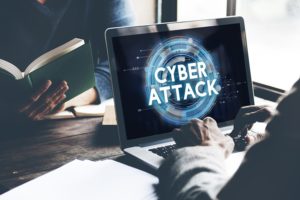Cyber attacks are executed via the internet mostly for political or social reasons. These attacks target the general public or corporate and national organizations and are executed through the spread of malicious programs like viruses, fake websites, unauthorized web access, and several other means of stealing institutional or personal data targets of attacks, causing extensive damage. Cyber attacks can include the following consequences:
- Breach of access
- Password sniffing
- Private and public Web browser exploits
- Instant messaging abuse
- System infiltration
- Website defacement
- Intellectual property (IP) theft or unauthorized access
- Identity theft, extortion, fraud
- Stolen hardware, such as mobile devices or laptops
- Denial-of-service and distributed denial-of-service attacks
- Malware, pharming, spamming, spoofing, phishing, Trojans, spyware, and viruses
Of late, we find that an increasing number of organizations have experienced cyber attack incidents. This simultaneously increases the need for suitable cyber safety measures. With a variety of cyber attacks currently available, the hackers choose the one that depends on what they intend to do. With different hacking intentions, there are indeed a variety of cyber attacks and some of them are discussed below.
Types of Cyber Attacks
- Distributed denial-of-service (DDoS) attack
A DDoS attack refers to a malicious attempt to disrupt normal web traffic and take a website offline. This is executed by flooding a system, network or server with additional access requests than the regular numbers that can be handled. Very often, DDoS attacks are launched from several compromised devices, and are usually distributed globally via botnets.
- Ransomware
Ransomware is considered to be one of the fastest-growing forms of cyber attacks. This malicious software encrypts a victim’s files and then demands a payment to release them or allow the victim to access them. Here we need to understand that paying the ransom does not definitely ensure the recovery of all encrypted data.
- Social engineering
Social engineering betrays and manipulates individuals into exposing sensitive data by convincing them to grant access to a computer, system or building, or click malicious links. Two examples of social engineering are:
-
- Pharming: This attack redirects a website’s traffic to a fake website, where a user’s information is then compromised.
- Phishing: In this attack, the hacker tries to access sensitive data such as bank information and passwords by posing as a reliable individual. This is executed mostly via emails and can bring about huge damage to an organization.
- Virus
This piece of malicious code gets loaded onto a computer without the user being aware of it. It is capable of replicating itself and spreading to other computers by attaching itself to another computer file.
- Worms
Worms are capable of self-replicating themselves but do attach themselves to a program. They constantly search for vulnerabilities and report any identified weaknesses to the worm author.
- Trojans
This type of malware used for cyber attacks disguises itself as genuine software. That is, they pose as virus removal programs, but in reality, they execute malicious activities after getting installed on your PC.
- Spyware/adware
Spyware/adware gets installed on a PC without the user’s knowledge. It gets downloaded when the victim opens attachments, downloads infected software or clicks links. This is then followed by the spyware/adware monitoring your computer’s activity and collecting personal data.
- Attack vectors
Attack vectors are employed for gaining access to a network or computer in order to harvest stolen data or infect them with malware. Vectors have four main forms:
-
- Man in the middle (MITM): In MITM attacks, an attacker modifies the communication between two users, imitating both victims just to manipulate them and gain access to their personal data. While this takes place, the users are just not aware of the fact that they are actually communicating with an attacker and not with each other.
-
- Drive-by: In a drive-by cyber attack, users get targeted via their Internet browser. Next, malware gets installed on their computer instantly when they visit an infected website. This installation can also happen when a user visits a genuine website that has been compromised by criminal hackers, either redirecting them to a malicious site or infecting them directly.
-
- Sequel injection: An SQL attack takes place when an attacker inserts malicious code into a server that uses SQL. SQL injection attacks are successful only when a security vulnerability exists in an application’s software. In a successful SQL attack, a server is forced to modify or provide access to data.
-
- Zero-day attack: The use of outdated or unpatched software makes room for more opportunities through which criminal hackers take advantage of known vulnerabilities capable of bringing the entire system down. A zero-day exploit happens when a vulnerability is made public before a solution or patch has been rolled out by the developer.
Why is Cyber Safety Important?
Today, the internet plays a major role in our lives as we depend on it for communicating via emails and instant messages, and also for other daily activities like shopping, studying, traveling, banking, etc. For most of these activities, you will have to use some of your personal details/data that are actually targeted by hackers. Protecting this data is thus becoming a growing necessity. Any computer failing to have correct security controls can become vulnerable and can also get infected with malicious logic, thus any type of data can be accessed within just a few seconds.
It is an appreciated fact that the internet has given us a wide range of learning opportunities, but there are also risks associated with these opportunities. Videos, photos, and other personal data shared by an individual on social networking sites like Twitter and Facebook can be misused used by others and this could lead to serious outcomes. Social networking websites are presently becoming the most popular medium for sharing data and connecting with other people. The sad part is that these sites have created different opportunities for cybercrimes, information leakage, and compromised personal identities.
Therefore, it is essential for individuals to understand how to protect against cyber threats by constantly following vital cyber safety tips. These cyber safety tips will educate individuals on how to protect computers and personal data and prevent them from being hacked and misused for inappropriate online behavior. Developing a safer online environment is thus essential for eliminating cyber threats.
Cyber Safety Tips of 2019
Prevent cyber attacks by regularly employing the following cyber safety tips that will help protect yourself against the growing variety of more sophisticated cybercrimes:
- Constantly update your software
This safety measure is extremely important mostly when you are operating systems and internet security software. Very often, cybercriminals use known exploits or flaws in your software in order to gain access to your computer. Patching those flaws and exploits can reduce the chances of you becoming a target of attack.
- Create strong passwords
Make sure not to repeat your passwords on different websites. Keep changing your passwords regularly and make them complex so that they cannot be easily guessed by strangers. Let your passwords be a blend of at least 10 letters, symbols, numbers, and special characters. A password management application will help in keeping your passwords locked down.
- Strengthen your home network
It is a good idea to begin with a strong encryption password and a virtual private network. A VPN is capable of encrypting all traffic leaving your devices until it arrives at its destination. Even if cybercriminals get to hack your communication line, they will not intercept anything but encrypted data. Hence, it is a good idea to use a VPN every time you use a public Wi-Fi network, whether in a café, library, airport, or hotel.
Remember to always keep your private and personal information locked down. Refrain from sharing your personal details publicly. This may be difficult but the lesser the details you expose the more beneficial it is for you as your chances of being attacked will also reduce.
- Be aware of major security breaches
If you are doing business with a merchant or have an account on a website that has been impacted by a security breach, find out what data the hackers accessed and instantly change your password.
- Adopt measures to protect yourself against identity theft
Identity theft happens when someone illegally obtains your personal data in a way via deception or fraud, mostly for economic gain. You could get tricked into giving personal data over the internet, or a thief could steal your email to access account details. This is why it is essential for you to protect your personal data. A VPN also protects the data you send and receive online, particularly when accessing the internet on public Wi-Fi.
- Brief your child about the internet
At home, it is a necessity that you teach your kids about acceptable use of the internet without locking down communication channels. Children will have to be comfortable in approaching their parents if they experience any kind of online harassment, bullying, or stalking.
The growing usage of the internet and social media has made cyber safety even more important than it was before. The increase in sophisticated cyber threats like phishing scams, data theft, and several other cyber vulnerabilities insist on the need for users to be alert and always be conscious of protecting their data. Understanding the above-discussed cyber attacks and the different cyber safety measures will surely help individuals to think before sharing or posting any data via the internet or on social media websites. Parents should also talk to their children about various cyber safety tips. In this way, the future generation will be well-informed about the dangers of the internet and also know how to protect themselves by adopting suitable cyber safety tips.
How To Prevent Ransomware 2018
By following few best security practices a user can prevent ransomware infection. Improve your defenses and stay safe from all types of online threats by rigorously following these guidelines:
- Constantly update your software
- Create strong passwords
- Strengthen your home network
- Manage your social media settings
- Be aware of major security breaches
- Adopt measures to protect yourself against identity theft
- Brief your child about the internet
Related Blogs:
How A Website Security Scanner Helps Lessen Future Cyber Attacks









